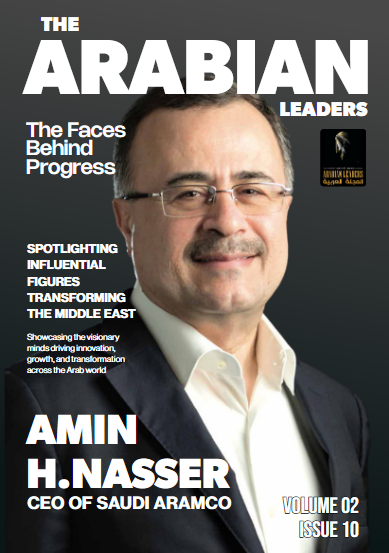Osamah Al-Muslim: Portal Creator of the Arab Literary Imagination

Introduction
In a region where classical poetry and realist fiction have long dominated the literary tradition, Osamah Al-Muslim has carved an entirely new path—one that ventures boldly into the worlds of fantasy, folklore, and the supernatural. Known for his vivid imagination, gripping storytelling, and deeply rooted cultural references, Al-Muslim has emerged as one of Saudi Arabia’s most popular and transformative contemporary authors. His books are not merely stories—they are immersive universes that combine elements of myth, history, and modern suspense, speaking directly to the dreams and anxieties of the Arab youth.
Hailing from Al-Ahsa, a city rich in cultural heritage, Al-Muslim carries forward a legacy of storytelling infused with the textures of the Gulf. But he does so with a modern twist, blending his academic background in English literature with a global sensibility shaped in part by time spent in the United States. This East-meets-West synthesis allows him to craft narratives that are both familiar and fantastical, local and universal. His popularity—fueled in part by a strategic use of social media—has turned him into a literary influencer, making fantasy fiction more mainstream and accessible in the Arab world.
Osamah Al-Muslim’s work transcends mere genre; it marks a cultural shift. At a time when young Arab readers are seeking stories that reflect both their identity and their aspirations, he offers them worlds where magic, struggle, and meaning coexist. Through bestselling novels, screen adaptations, and fan engagement, Al-Muslim is redefining what it means to be a writer in the modern Arab world. He is not just telling stories—he is shaping the future of Arab literature.
A Literary Voice Born in Al-Ahsa
Osamah bin Mohammed Al-Muslim, widely recognized as Osamah Al-Muslim, is a seminal figure in contemporary Saudi literature, known for his compelling contributions to the genre of fantasy and speculative fiction. Born in the culturally rich region of Al-Ahsa, his early life was a confluence of global and local influences. He spent part of his childhood abroad, in the United States, which expanded his worldview before returning to his homeland to continue his studies.
Back in Al-Ahsa, Al-Muslim immersed himself in literature and language, eventually earning a degree in English Language and Literature from King Faisal University. His academic grounding equipped him with both Western and Arab literary traditions, laying the foundation for the cross-cultural storytelling that would become his signature. He later took on the role of lecturer at Al-Ahsa’s Technical College, further rooting himself in education and intellectual exchange.
From Manuscripts to Masterpieces
Al-Muslim’s literary debut began with the publication of his breakout novel Khof (Fear), which marked the arrival of a distinctive voice in Arab fiction. It was a story that resonated deeply with readers, merging elements of horror, mystery, and cultural myth. The novel’s success was unexpected and remarkable, especially considering it was initially rejected by traditional publishers, prompting Al-Muslim to self-publish.
This gamble paid off, and Khof quickly rose to prominence. It was later followed by sequels, extending the world and themes introduced in the first book. The series was not just a commercial success; it shifted perceptions of genre fiction in the Arab world and ushered in a new era where fantasy, horror, and the supernatural could be vehicles for cultural commentary and storytelling.
Myth, Magic, and Arab Heritage
What distinguishes Al-Muslim’s work is his ability to draw from Arab folklore, Islamic history, and regional mythology to craft deeply imaginative narratives. Creatures such as jinn, witches, demons, and other beings populate his worlds—not merely as tropes of horror or fantasy, but as richly layered metaphors rooted in cultural identity.
A creator of “portals to other worlds,” as he describes himself, Al-Muslim invents realms that blend the fantastical with the familiar. His imagination is cinematic, influenced by Hollywood storytelling and global fantasy conventions, yet always tinged with local color and meaning. Through the lens of parallel universes, ancient magic, and mythical landscapes, his works challenge readers to consider themes of power, destiny, gender, and societal transformation.
Iconic Works and Television Adaptations
Among Al-Muslim’s most iconic creations is Basatyn Arabistan (The Gardens of Arabistan), an epic saga that interweaves female empowerment, political intrigue, and mystical forces. Structured across multiple volumes, the series became a landmark achievement and was adapted for television by a major regional broadcaster.
This adaptation marked a significant milestone—not just for Al-Muslim’s career, but for genre fiction in the Arab world. It proved that regional fantasy could find success on screen and could rival international narratives in depth and popularity.
His other major series include Malhamat al-Buhoor al-Sabaa (The Epic of the Seven Seas), which explores aquatic kingdoms and nautical myths; Wahj al-Banafsaj (The Glow of Violet), an introspective yet fantastical tale; and Shabakat al-Ankaboot (The Spider’s Web), which delves into the digital age’s eerie intersections with magic and power.
Fantasy for a New Generation
Perhaps most remarkable is Al-Muslim’s popularity among young Arab readers, particularly women. His stories often feature strong, complex female protagonists—something still underrepresented in regional literature. These characters not only reflect the diversity of Arab womanhood but also challenge patriarchal structures within fictional and real-world societies.
Al-Muslim’s fanbase is deeply engaged, with readers often seeing his stories as reflections of their own struggles, desires, and dreams. His nuanced portrayals of female heroes stand in quiet defiance of stereotypes and mark a shift in the cultural narrative, making room for new forms of representation in Arabic literature.
A New Literary Movement
Al-Muslim’s contributions extend beyond the page. He is the founder of the League of Arab Horror and Fantasy Writers, a collective that seeks to elevate and professionalize these often-overlooked genres in the Arab world. His efforts have helped foster a literary environment where horror, science fiction, and fantasy are not fringe pursuits but vital components of modern storytelling.
His writing is characterized not just by imaginative breadth, but by emotional resonance. Themes of loneliness, courage, fear, and transformation play out in supernatural settings but always remain deeply human. He creates not escapist fantasies, but parallel realities where readers confront themselves.
Cultural Ambassador of a Literary Renaissance
Internationally, Al-Muslim is increasingly being recognized as a literary ambassador for Saudi Arabia’s evolving cultural identity. His novels have been translated into multiple languages, making them accessible to a wider audience. Foreign readers are introduced to Arab folklore through accessible, gripping narratives that simultaneously educate and entertain.
He also engages with literary communities abroad, often visiting schools, universities, and festivals to promote reading and writing. Through these engagements, Al-Muslim builds bridges between East and West, traditional and modern, sacred and speculative.
The Digital Age Author
A modern storyteller, Al-Muslim understands the power of digital platforms. His social media presence amplifies his literary voice, allowing him to connect directly with fans across the world. His videos often go viral, blending literary commentary with cinematic flair. These platforms serve not just as promotional tools but as spaces where literature meets lifestyle, and fiction becomes part of everyday identity.
His ability to leverage these channels has made him a literary influencer in the best sense—someone who promotes reading, inspires creativity, and sparks dialogue.
Beyond the Page: Influence and Impact
Al-Muslim’s influence extends into publishing trends and cultural dialogue. He has become a beacon for a new generation of Arab writers who see fantasy and horror as legitimate, even essential, forms of expression. His story of initial rejection and eventual triumph inspires countless aspiring authors across the Arab world to pursue their own narratives, no matter how unconventional.
In regions where conservative literary tastes have often dominated, Al-Muslim’s popularity has sometimes sparked critique. Detractors question the legitimacy of genre fiction or misunderstand the messages in his stories. However, these critiques have not slowed his momentum; rather, they underscore the disruptive, revolutionary nature of his work.
A Portal to Imagination
Shaping the Future of Arab Literature
Osamah Al-Muslim’s story is not just one of personal success—it is the tale of a genre rising in stature across the Arab world. He represents a literary shift: from realism to surrealism, from historical to fantastical, from tradition to transformation. Through his novels, Arab readers have rediscovered the magic of storytelling and the relevance of fantasy in reflecting real-world complexities.
Redefining Cultural Norms Through Fiction
Al-Muslim challenges dominant narratives. By presenting female leads who shape destiny, creatures drawn from Arab myth, and layered moral dilemmas, he gives voice to the complexities of modern Arab identity. His narratives blur the line between the known and the imagined, demanding deeper reflection from his readers.
The Author as Connector
As both a writer and a communicator, Al-Muslim connects generations, genres, and geographies. His cross-cultural experiences allow him to speak fluently to both Arab heritage and global fantasy traditions. In doing so, he becomes a rare conduit between worlds—literally and figuratively.
Redefining Arab Fantasy: A Genre Reimagined
Osamah Al-Muslim’s contribution to Arab literature lies not just in his prolific storytelling but in how he has redefined fantasy through an authentically Arab lens. While global fantasy fiction has long been dominated by Western mythology and folklore, Al-Muslim delves deep into Arab traditions, bringing jinn, ancient myths, and mystical landscapes from the region into the spotlight. Rather than mimic the Western fantasy archetype, he built his own world, one that speaks directly to the imagination of young Arab readers. His books are portals to culturally grounded realms, filled with witches, demons, and supernatural forces that draw on the Islamic and Arab mystical imagination—often overlooked or misrepresented in mainstream literature.
A Literary World Rooted in Cultural Identity
The universes Osamah creates are intricately woven with symbols, themes, and metaphors that reflect Arab identity. He is not just a writer of stories but a curator of a cultural renaissance, reminding Arab youth that their heritage holds just as much magic and power as any Western tale. His series like Basatyn Arabistan and The Epic of the Seven Seas do not shy away from complex ideas, yet remain deeply accessible. They explore identity, fate, moral struggle, and the search for meaning, all against the backdrop of fantastical elements derived from his cultural milieu. Al-Muslim’s brand of fantasy is both rooted and revolutionary—respectful of the past yet thrillingly contemporary.
Women at the Center of the Narrative
A striking aspect of Al-Muslim’s writing is his portrayal of women. In a literary landscape where female characters are often peripheral, he writes women as leaders, warriors, thinkers, and moral compasses. His female protagonists are not afterthoughts—they are central to the plot, with deeply layered personalities, strengths, and vulnerabilities. This conscious decision challenges stereotypes within Arab publishing, offering young women characters they can identify with and admire. These characters are not defined by the male gaze or societal expectations but by their own choices and convictions. Al-Muslim has often spoken about the strong women in his life who inspire his characters, which resonates in the authenticity of their depiction.
Facing Literary Elitism with Popular Success
Al-Muslim’s massive popularity, especially among the youth, has not shielded him from critique. Some intellectual circles have dismissed his work as “pop fiction,” unconvinced by its fantasy focus and mainstream appeal. But this criticism reveals more about prevailing literary elitism than it does about the quality of his work. Like many great genre writers before him, Al-Muslim has proven that accessibility does not preclude depth. His novels are widely read not because they are simple, but because they are compelling and emotionally intelligent. They speak the language of the young without pandering, challenge without alienating, and inspire without preaching.
Literature Meets the Digital Age
A modern storyteller, Osamah Al-Muslim fully embraces digital tools to connect with his audience. With hundreds of thousands of followers across platforms like Instagram and TikTok, he transcends the traditional role of an author. His content includes teasers, behind-the-scenes moments, fan engagements, and thematic explorations of his literary universe. This dual role—writer and influencer—breaks down barriers between reader and author, turning literature into an interactive, evolving experience. In doing so, he brings literature to the social spaces where his audience lives, reads, and dreams. It’s a new model of authorship, one that uses virality not as a gimmick, but as a genuine tool of community building.
Breaking Down Borders Through Storytelling
Osamah Al-Muslim’s reach is not limited to Saudi Arabia or the Gulf. His translated works are gaining traction across regions, helping introduce Arabic fantasy to non-Arabic-speaking audiences. His stories resonate not only because of their originality but also because they reflect universal emotions—courage, love, fear, betrayal—within a unique cultural context. As publishers, producers, and readers in different parts of the world take note, Al-Muslim’s global footprint continues to grow. This global attention challenges the outdated notion that Arab literature must conform to Western literary molds to be accepted internationally.
Building a Genre, Building a Movement
Beyond his own books, Al-Muslim is deeply invested in the development of fantasy and horror literature in the Arab world. His establishment of the League of Arab Horror and Fantasy Writers shows a vision larger than personal success. He is cultivating a movement, creating space for emerging voices in genres that have long been marginalized. By doing so, he’s not just writing stories—he’s creating a literary ecosystem where fantasy is no longer seen as escapism, but as a legitimate avenue for critical thought, social reflection, and cultural pride.
Conclusion: A Legacy Written in Imagination
Osamah Al-Muslim’s literary journey is more than a personal triumph—it is a turning point in the evolution of Arab storytelling. His rise reflects a hunger in Arab youth for narratives that both mirror their cultural roots and expand the boundaries of imagination. In every witch, jinn, or shadowy portal he crafts, there’s a message: that Arab stories deserve to stand tall among global genres, not as imitations but as originals.
Al-Muslim has become a cultural force, using storytelling as a bridge between tradition and futurism, literature and multimedia, fiction and community. Through his books, workshops, social media presence, and advocacy, he has democratized fantasy literature in the Arab world—making it more inclusive, dynamic, and inspiring. As more readers around the world discover his works, his impact is only just beginning. In a world often fractured by misunderstanding and division, his fantastical universes offer a powerful reminder: that stories can unite us, transform us, and ignite something deep within us all.







